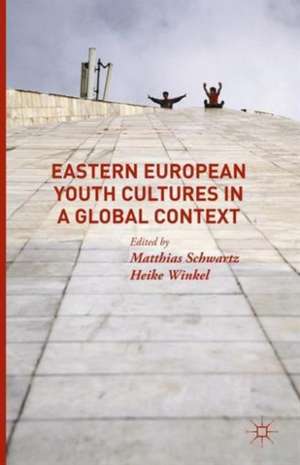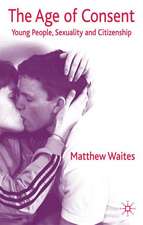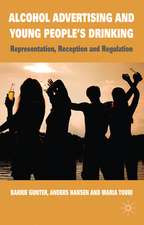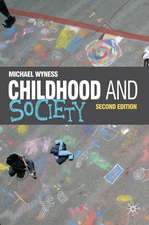Eastern European Youth Cultures in a Global Context
Editat de Matthias Schwartz, Heike Winkelen Limba Engleză Hardback – 20 dec 2015
Eastern European Youth Cultures in a Global Context takes this situation as a starting point for an examination of generational change, cultural belongings, political activism and everyday practices of young people in different Eastern European countries from an interdisciplinary perspective. It argues that the conditions of global change not only call for a differentiated evaluation ofyouth cultures, but also for a revision of our understanding of 'youth' itself – in Eastern Europe and beyond.
Preț: 395.63 lei
Nou
Puncte Express: 593
Preț estimativ în valută:
75.71€ • 80.95$ • 63.12£
75.71€ • 80.95$ • 63.12£
Carte tipărită la comandă
Livrare economică 17 aprilie-01 mai
Preluare comenzi: 021 569.72.76
Specificații
ISBN-13: 9781137385123
ISBN-10: 113738512X
Pagini: 374
Ilustrații: XII, 374 p.
Dimensiuni: 140 x 216 x 22 mm
Greutate: 0.59 kg
Ediția:1st ed. 2015
Editura: Palgrave Macmillan UK
Colecția Palgrave Macmillan
Locul publicării:London, United Kingdom
ISBN-10: 113738512X
Pagini: 374
Ilustrații: XII, 374 p.
Dimensiuni: 140 x 216 x 22 mm
Greutate: 0.59 kg
Ediția:1st ed. 2015
Editura: Palgrave Macmillan UK
Colecția Palgrave Macmillan
Locul publicării:London, United Kingdom
Cuprins
Introduction; Matthias Schwarz and Heike Winkel
PART I: RECONSIDERING GENERATIONAL CHANGE
1. The End of Childhood and/or the Discovery of the Tineidzher? Adolescence in Soviet and Post-Soviet Culture; Catriona Kelly
2. Youth Cultures and the Formation of a New Political Generation in Eastern Europe; Ken Roberts
3. Fast Forward to Capitalism? Accelerated Youth in Post-Socialism; Herwig Reiter and Christine Steiger
4. Revival Without Nostalgia. The Dizel' Movement, Serbian Nineties Cultural Trauma and Globalized Youth Cultures; Jovana Papovi? and Astrea Pejovi?
5. Symptom of the Loser and the Melancholy of the Post-Soviet Generation; Tamara Hundorova
PART II: POPULAR BELONGINGS: SUBCULTURAL PLACES AND GLOBALIZED SPACES
6. 'Rap on Rap is Sacred': The Appropriation of Hip Hop in the Czech Republic; Anna Oravcová
7. Flaming Flares, Football Fanatics and Political Rebellion. Resistant Youth Cultures in Late Capitalism; Dominik Antonowicz, Rados?aw Kossakowski andTomasz Szlendak
8. Everything Feels Bad. Figurations of the Self in Contemporary Eastern European Literature; Matthias Schwartz
9. 'Bright reference point of our youth'. Bondy, Podsiad?o, and the Redefinition of the Underground; Alfrun Kliems
PART III: RESHAPING POLITICAL ACTIVISM: BETWEEN REBELLION AND ADJUSTMENT
10. Fallen Vanguards and Vanished Rebels? Political Youth Involvement in Extraordinary Times; Félix Krawatzek
11: 'To serve like a man' – Ukraine's Euromaidan and the Questions of Gender, Nationalism and Generational Change; Sabine Roßmann
12. The Conception of Revolutionary Youth in Maksim Gor'kii's The Mother and Zakhar Prilepin's San'kia; Matthias Meindl
13. 'Polittusovka' – An Alternative Public Space of Young Politicians in Contemporary Russia; Anna Zhelnina
PART IV: CONTESTED AGENCY: CIVIC ENGAGEMENT AND EVERYDAY PRACTICES
14. Youth Cultures in Contemporary Russia: Memory, Politics and Solidarity; Elena Omelchenko and Guzel Sabirova
15. Public Discourse and Volunteer Militias in Post-Soviet Russia; Gleb Tsipursky
16. Battlefield Internet: Young Russian SNS Users and New-Media State Propaganda;
Vera Zvereva
17. 'Flashy' Pictures: Social Activist Comics and Russian Youth; José Alaniz
18. Youth in the Post-Soviet Space. Is the Central Asian Case Really so Different?; Stefan B. Kirmse
PART I: RECONSIDERING GENERATIONAL CHANGE
1. The End of Childhood and/or the Discovery of the Tineidzher? Adolescence in Soviet and Post-Soviet Culture; Catriona Kelly
2. Youth Cultures and the Formation of a New Political Generation in Eastern Europe; Ken Roberts
3. Fast Forward to Capitalism? Accelerated Youth in Post-Socialism; Herwig Reiter and Christine Steiger
4. Revival Without Nostalgia. The Dizel' Movement, Serbian Nineties Cultural Trauma and Globalized Youth Cultures; Jovana Papovi? and Astrea Pejovi?
5. Symptom of the Loser and the Melancholy of the Post-Soviet Generation; Tamara Hundorova
PART II: POPULAR BELONGINGS: SUBCULTURAL PLACES AND GLOBALIZED SPACES
6. 'Rap on Rap is Sacred': The Appropriation of Hip Hop in the Czech Republic; Anna Oravcová
7. Flaming Flares, Football Fanatics and Political Rebellion. Resistant Youth Cultures in Late Capitalism; Dominik Antonowicz, Rados?aw Kossakowski andTomasz Szlendak
8. Everything Feels Bad. Figurations of the Self in Contemporary Eastern European Literature; Matthias Schwartz
9. 'Bright reference point of our youth'. Bondy, Podsiad?o, and the Redefinition of the Underground; Alfrun Kliems
PART III: RESHAPING POLITICAL ACTIVISM: BETWEEN REBELLION AND ADJUSTMENT
10. Fallen Vanguards and Vanished Rebels? Political Youth Involvement in Extraordinary Times; Félix Krawatzek
11: 'To serve like a man' – Ukraine's Euromaidan and the Questions of Gender, Nationalism and Generational Change; Sabine Roßmann
12. The Conception of Revolutionary Youth in Maksim Gor'kii's The Mother and Zakhar Prilepin's San'kia; Matthias Meindl
13. 'Polittusovka' – An Alternative Public Space of Young Politicians in Contemporary Russia; Anna Zhelnina
PART IV: CONTESTED AGENCY: CIVIC ENGAGEMENT AND EVERYDAY PRACTICES
14. Youth Cultures in Contemporary Russia: Memory, Politics and Solidarity; Elena Omelchenko and Guzel Sabirova
15. Public Discourse and Volunteer Militias in Post-Soviet Russia; Gleb Tsipursky
16. Battlefield Internet: Young Russian SNS Users and New-Media State Propaganda;
Vera Zvereva
17. 'Flashy' Pictures: Social Activist Comics and Russian Youth; José Alaniz
18. Youth in the Post-Soviet Space. Is the Central Asian Case Really so Different?; Stefan B. Kirmse
Recenzii
“This book is highly recommended for reading. It provides scholars with unique material. It gives food for thought. The target audiences consists not only of scholars in the field, but all interested in youth culture and those who interact with the youth on a frequent basis, such as teachers in both secondary and higher education.” (Alla A. Sal’nikova, Jahrbücher für Geschichte Osteuropas. jgo.e-reviews, Vol. 4, 2017)
“Claiming to expand recent ‘research efforts to redefine Eastern Europe and to rethink youth’ … this hefty tome is comprised of eighteen chapters divided into four parts, following the editors’ contextualizing Introduction. … Each of the chapters and the book as a whole certainly contributes original material and important insights to the expanding field of youth studies.” (Fran Markowitz, Slavic Review, 2017)
“Claiming to expand recent ‘research efforts to redefine Eastern Europe and to rethink youth’ … this hefty tome is comprised of eighteen chapters divided into four parts, following the editors’ contextualizing Introduction. … Each of the chapters and the book as a whole certainly contributes original material and important insights to the expanding field of youth studies.” (Fran Markowitz, Slavic Review, 2017)
Notă biografică
Matthias Schwartz is a Research Associate at the Centre for Literary and Cultural Research Berlin, Germany. His research interests include the cultural history of Russian and Soviet adventure literature, science fiction and popular sciences; Eastern European youth cultures, memory cultures and cultures of affect; and contemporary literatures in a globalized world.
Heike Winkel is a Research Fellow and lecturer at the Institute for East-European Studies at Freie Universität Berlin, Germany. Her research interests include the Stalinist Soviet Union, contemporary Russian and Czech literature and culture with a focus on identity politics, mnemonic aspects of literature, and intersections of history and literature.
Heike Winkel is a Research Fellow and lecturer at the Institute for East-European Studies at Freie Universität Berlin, Germany. Her research interests include the Stalinist Soviet Union, contemporary Russian and Czech literature and culture with a focus on identity politics, mnemonic aspects of literature, and intersections of history and literature.
Textul de pe ultima copertă
The demise of state Socialisms caused radical social, cultural and economic changes in Eastern Europe. Since then, young people have been confronted with fundamental disruptions and transformations to their daily environment, while an unsettling, globalized world substantially reshapes local belongings and conventional values. In times of multiple instabilities and uncertainties, this volume argues, young people prefer to try to adjust to given circumstances than to adopt the behaviour of potential rebellious, adolescent role models, dissident counter-cultures or artistic breakings of taboo.
Eastern European Youth Cultures in a Global Context takes this situation as a starting point for an examination of generational change, cultural belongings, political activism and everyday practices of young people in different Eastern European countries from an interdisciplinary perspective. It argues that the conditions of global change not only call for a differentiated evaluation ofyouth cultures, but also for a revision of our understanding of 'youth' itself – in Eastern Europe and beyond.
Eastern European Youth Cultures in a Global Context takes this situation as a starting point for an examination of generational change, cultural belongings, political activism and everyday practices of young people in different Eastern European countries from an interdisciplinary perspective. It argues that the conditions of global change not only call for a differentiated evaluation ofyouth cultures, but also for a revision of our understanding of 'youth' itself – in Eastern Europe and beyond.













